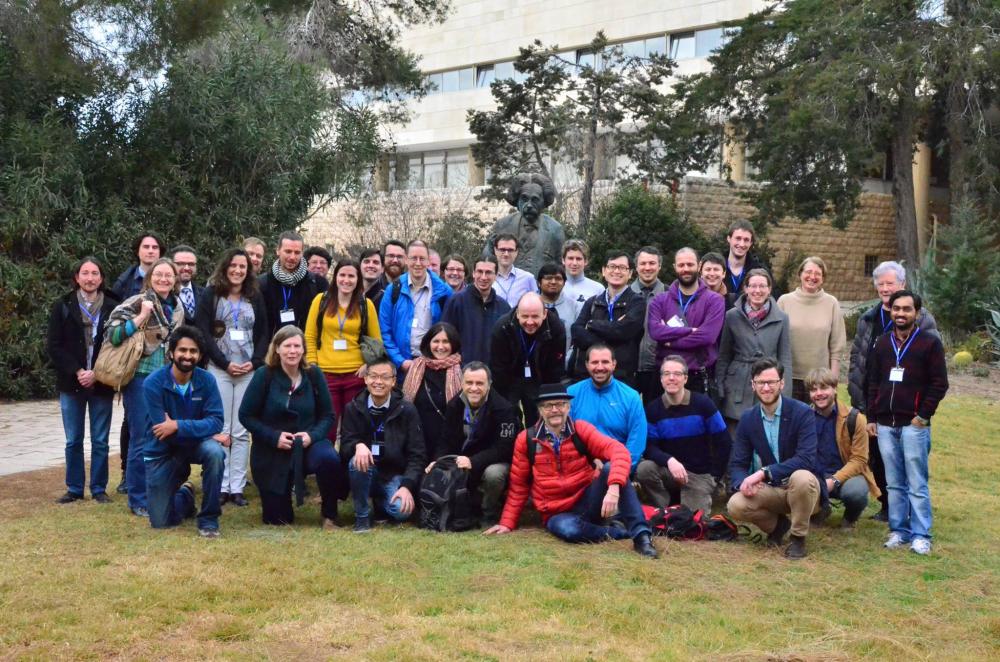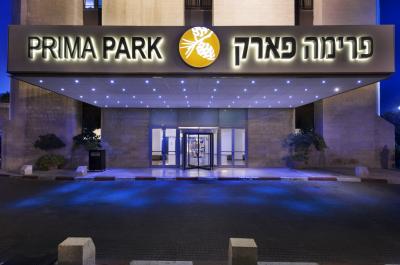Molcas Developers Workshop
The Hebrew University of Jerusalem is hosting the 5th Molcas Developers’ Workshop from the 7th to the 10th of February. The venue is located on the Givat Ram Campus and will mainly take place in the lecture hall of the Los Angeles Building and the lecture hall of the Computer Science and Engineering Building.

The workshop starts on Tuesday the 7th of February with an Introduction of the developers and the Theoretical/Computational Chemistry groups in Jerusalem. After that there is a hands-on session for newcomers and beginners on working with Molcas. On Wednesday and Thursday the workshop will continue with a number of reports from Molcas developers and users. Each report take between 10 and 20 minutes covering a wide spectrum of topics that range from usage experience, newly implemented features, recent state-of-the-art applications to future plans for development. In addition there are five invited talks by Mario Barbatti, Benjamin Fingerhut, Benjamin Lasorne, Lyudmila Slipchenko and Françoise Remacle. These presentations will offer a scientific perspective for selected topics.
The workshop is sponsored by Molcas, The Hebrew University of Jerusalem and the Fritz Haber Center for Molecular Dynamics Research.
Program
Tuesday, February 7th
12:00 Beginning of the registration
in the Los Angeles building
13:00 – 14:30 Welcome and Introduction
in the Los Angeles building
14:30 – 18:00 Hands-on session
in the Computer Science building
Wednesday, February 8th
New Methods Session
in the Los Angeles building
09:00 – 09:20 Report: Origin independent intensities: length vs. velocity gauge
Lasse Kragh Sørensen, Uppsala University
09:20 – 09:40 Report: Frozen-Density Embedding for CASCI calculations
Alexander Zech, University of Geneva
09:40 – 10:00 Report: Muonic spectroscopy, an opportunity for theoretical chemistry to excel
Roland Lindh, Uppsala University
10:00 – 10:40 Scientific Perspective: Condensed-phase chemistry with the Effective Fragment Potential method: Theory and applications
Lyudmila Slipchenko, Purdue University
10:40 – 11:00 Coffee break
11:00 – 11:40 Scientific Perspective: Ultrafast non equilibrium dynamics induced by attopulses
Françoise Remacle, University of Liège
11:40 – 12:20 Scientific Perspective: Nonadiabatic Processes in Molecules Monitored with Coherent Ultrafast Nonlinear Spectroscopic Techniques
Benjamin Fingerhut, Max Born Institute Berlin
12:20 – 14:00 Lunch
Future Development Session
in the Los Angeles building
14:00 – 14:20 Report: Molcas' web presence: what we could do even better
Luca De Vico, University of Siena
14:20 – 14:30 Report: Brief activity report and a couple of Molcas-related issues
Liviu Ungur, KU Leuven
14:30 – 14:40 Report: Parallel Performance of CASSCF/CASPT2 calculations within Molcas
Markus Oppel, University of Vienna
14:40 – 15:00 Report: Towards LGPL distribution of OpenMolcas
Valera Veryzaov, Lund University
15:00 – 15:20 Coffee break
15:20 – 18:00 Discussion/Future development
Thursday, February 9th
DMRG Session
in the Los Angeles building
09:00 – 09:20 Report: Capabilities of the QCMaquis DMRG program in Molcas - An Overview
Markus Reiher, ETH Zürich
09:20 – 09:40 Report: DMRG-CASPT2 with Molcas-CheMPS2 interface
Quan Phung, KU Leuven
09:40 – 10:00 Report: n-electron valence state perturbation theory with DMRG and Cholesky decomposition: application to spin-crossover compounds
Leon Freitag, ETH Zürich
10:00 – 10:20 Report: Automated Selection of Active Orbital Spaces
Christopher Stein, ETH Zürich
Molecular Dynamics Session
in the Los Angeles building
10:20 – 10:40 Report: Quantum-classical dynamics for electronic non-adiabatic processes: An exact-factorization approach
Federica Agostini, University Paris-Sud
10:40 – 11:00 Coffee break
11:00 – 11:40 Scientific Perspective: Dynamics of Organic Materials with Optical Activity: Advances, Appraisal, Applications
Mario Barbatti, Aix-Marseille University
11:40 – 12:20 Scientific Perspective: Gaussian-based direct quantum dynamics applied to non-adiabatic photochemistry
Benjamin Lasorne, University Montpelier
12:20 – 14:00 Lunch
14:00 – 14:10 Report: On the implementation of XMS-CASPT2 in Molcas
Per Ake Malmquist, Lund University
14:20 – 14:40 Report: Molecular Dynamics with Molcas: Technical details and Application to chemiluminescence
Morgane Vacher, Uppsala University
14:40 – 15:00 Report: Non-equilibrium Electronic Dynamics and Potential Application
Raphael Levine, The Hebrew University of Jerusalem
15:00 – 15:20 Coffee break
15:20 – 15:40 Report: Absorption lineshape of the rhodamine dimer tethered on DNA from molecular dynamics simulation: the effect of environment and geometry sampling on the electronic properties of the chromophore
Ksenia Komarova, University of Liège
15:40 – 16:00 Report: Converging many-body correlation energies by means of sequence extrapolation
Javier Segarra-Martí, ENS Lyon
16:00 – 16:20 Report: Controlling excited state dynamics by surface plasmons: Molecular Dynamics for Strong coupling
Hoi Ling Luk, University of Jyväskylä
19:00 Gala Dinner (at The Eucalyptus)
Friday, February 10th
09:00 – 12:00 Old City Tour
12:00 Departure
Directions
Transportation from the Ben Gurion Airport to Jerusalem
The Ben-Gurion International Airport is located ca 50 km away from Jerusalem. There are several options for transportaion from the airport to Jerusalem:
1. By taxi: There is a taxi stand on the left side of the main exit gate. The taxi costs between 250 and 350 NIS ($65-95), depending on the arrival time. In addition there are taxi services that can be ordered in advance or from the airport by phone. They usually cost around 180-200 NIS (ca. $50). Two examples of such taxi services are: Romema Taxi and Taxi99.
2. By shuttle bus: A shared door-to-door shuttle bus (Nesher taxi) is available 24/7 directly at the main exit of the terminal. The service is available 24/7 and costs 64 NIS/person ($17). The Nesher taxi is a yellow colored van with seats for 10-12 people.
3. Regular bus lines are available from 6am to 10pm. The Line 5A should be taken to El-Al junction and then line 947/423/425 to Jerusalem central bus station (21.5 NIS). The conference hotel Prima Park is located 1km from the central bus station. It can be reached by foot or by the light train from the central station to Kyriat-Moshe station (5.9 NIS).
Conference venue
The main event will take place in the lecture hall of the Chemistry Institute in the Los Angeles building.
Participants
Agostini, Federica (University Paris-Sud)
Barbatti, Mario (Aix-Marseille Université)
Borin, Venia (The Hebrew University of Jerusalem)
De Vico, Luca (Università degli Studi di Siena)
Fernández Galván, Ignacio (Uppsala University)
Fingerhut, Benjamin (Max Born Institute Berlin)
Freitag, Leon (ETH Zurich)
Gonzalez, Leticia (University of Vienna)
Hermida Ramon, Jose Manuel (University of Vigo)
Hirshberg, Barak (The Hebrew University of Jerusalem)
Knecht, Stefan (ETH Zurich)
Komarova, Ksenia (Université de Liège)
Kovačević, Goran (Ruđer Bošković Institute)
Lasorne, Benjamin (Université Montpellier)
Levine, Raphael (The Hebrew University of Jerusalem)
Livshitz, Ester (The Hebrew University of Jerusalem)
Lindh, Roland (Uppsala University)
Luk, Hoi Ling (University of Jyväskylä)
Malmqvist, Per Åke (Lund University)
Olivucci, Massimo (Università degli Studi di Siena)
Oppel, Markus (University of Vienna)
Phung, Quan (KU Leuven)
Pierloot, Kristine (KU Leuven)
Rao, Aditya (The Hebrew University of Jerusalem)
Reiher, Markus (ETH Zurich)
Remacle, Francoise (Université de Liège)
Schapiro, Igor (The Hebrew University of Jerusalem)
Schwanen, Valérie (Université de Liège)
Segarra-Martí, Javier (École Normale Supérieure de Lyon)
Sen, Saumik (The Hebrew University of Jerusalem)
Slipchenko, Ludmila (Purdue University)
Sorensen, Lasse Kragh (Uppsala University)
Stein, Christopher Johannes (ETH Zurich)
Ungur, Liviu (KU Leuven)
Vacher, Morgane (Uppsala University)
Valentini, Alessio (Université de Liège)
van den Wildenberg, Stephan (Université de Liège)
Veryazov, Valera (Lund University)
Widmark, Per-Olof (Lund University)
Wiebeler, Christian (The Hebrew University of Jerusalem)
Zech, Alexander (University of Geneva)
Accommodation
The participants of the Molcas Developers Workshop are accommodated in the Prima Park Hotel in Jerusalem. The venue can be reached from the hotel by 15 minutes walking.
The full address is: Prima Park, Ze'ev Vilnai St 2, Jerusalem, 95435 Israel
Phone number: +972-2-6582222
 |  |
Users Workshop
A Molcas Users Workshop will take place on the 6th of February just before the Developers Meeting. The workshop will be in the computer class room 4 (כיתה 4) of the Sprinzak Building on the Givat Ram Campus. The required programs will be installed locally for the workshop so the participants don't need to bring a laptop. The participation is free of charge but the number of participants is limited to 30.
http://einsteinium.fh.huji.ac.il/cgi-bin/farm/molcas_new_ticket_SGE_new
The program of the workshop is the following:
9.30- 10.30 Introduction to Molcas lecture1.pdf
10.30-12.00 Introduction lab lab1.pdf
12.00-13.30 Lunch
13.30-14.30 MCSCF lecture2.pdf
14.30-16.00 MCSCF lab lab2.zip
16.00-17.00 Dynamics
17.00-18.00 Dynamics lab lab3.zip slides.pdf